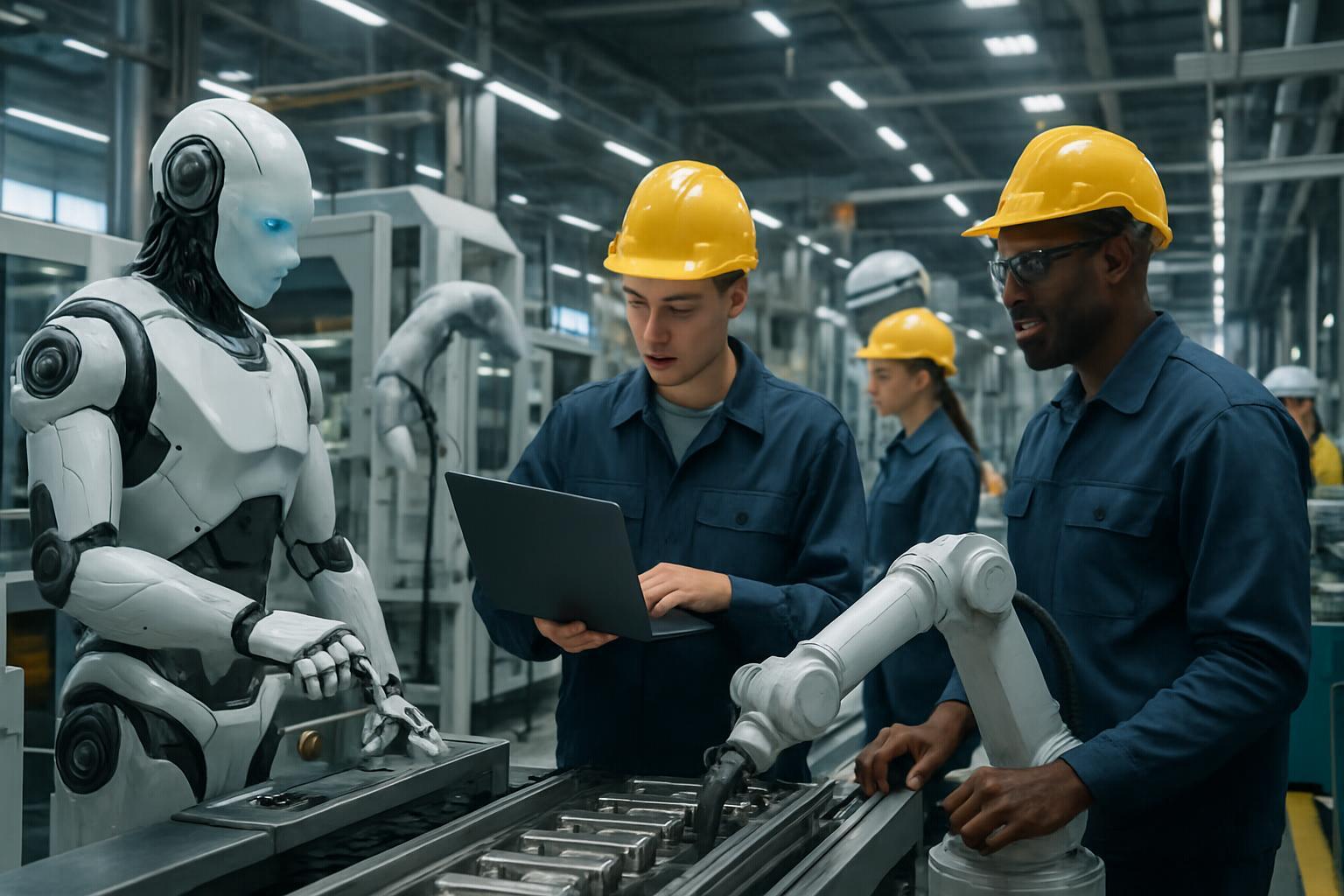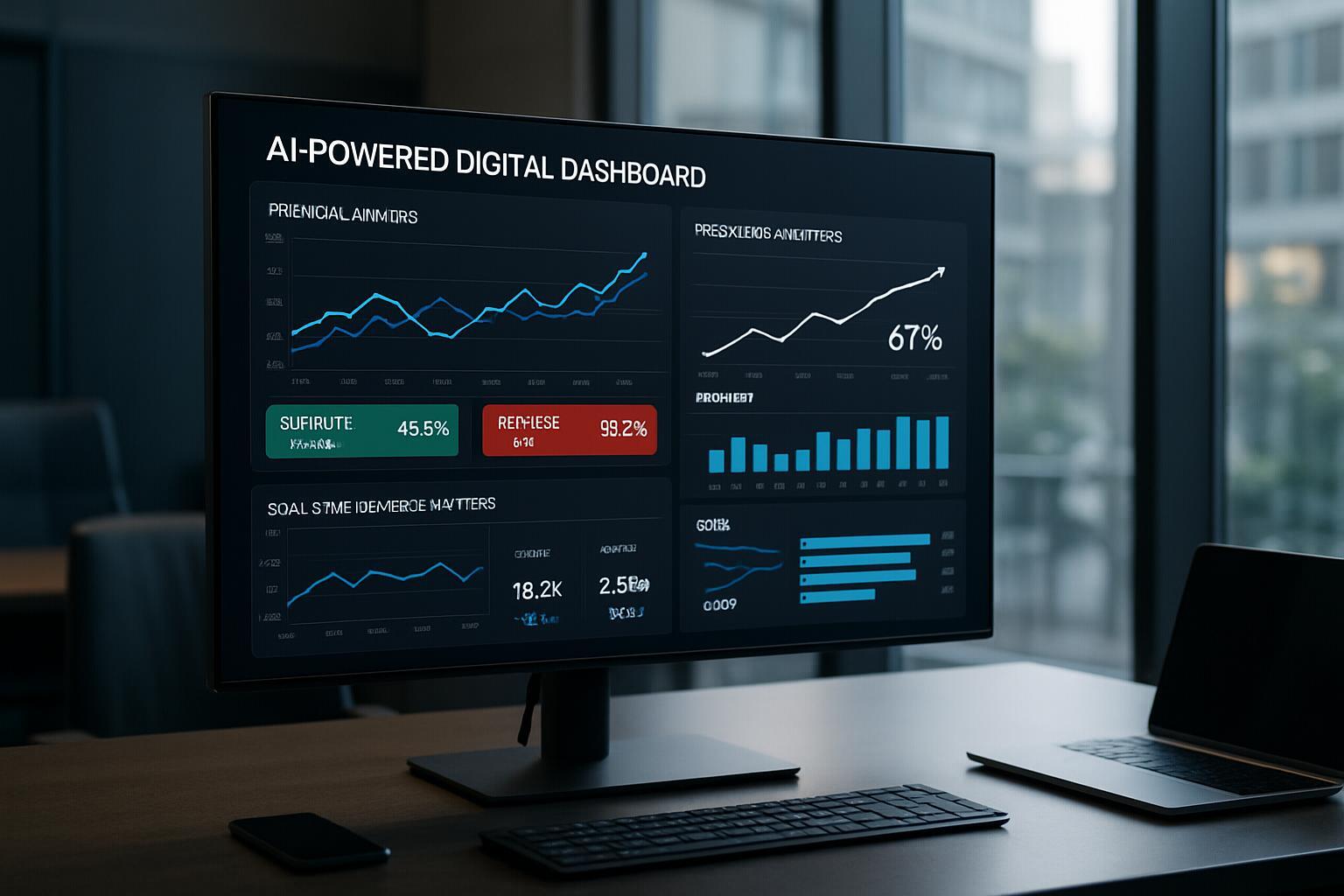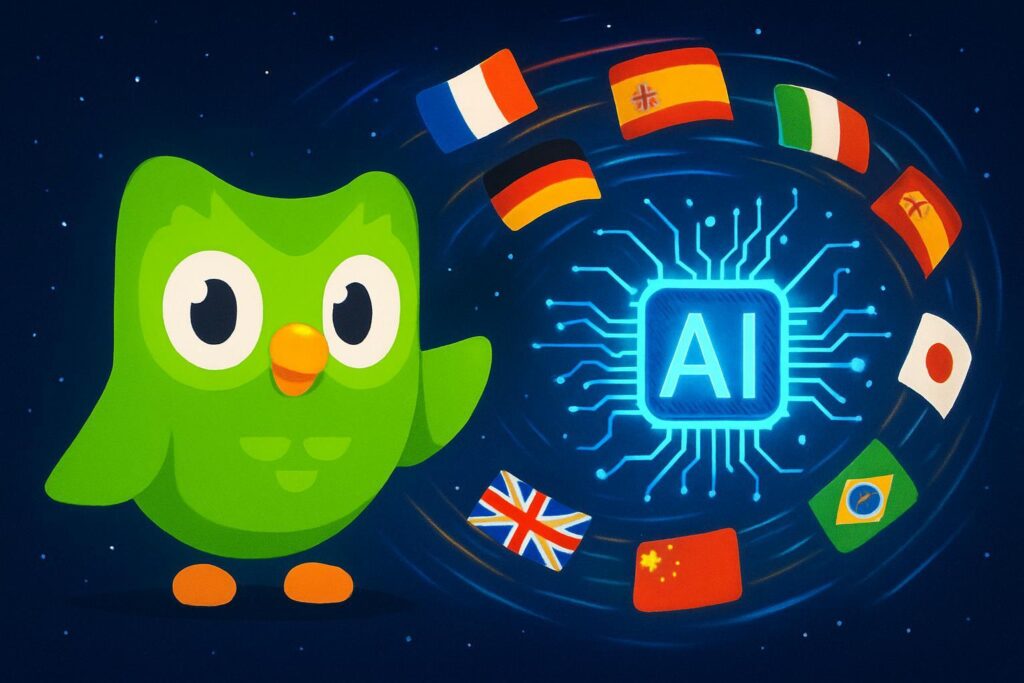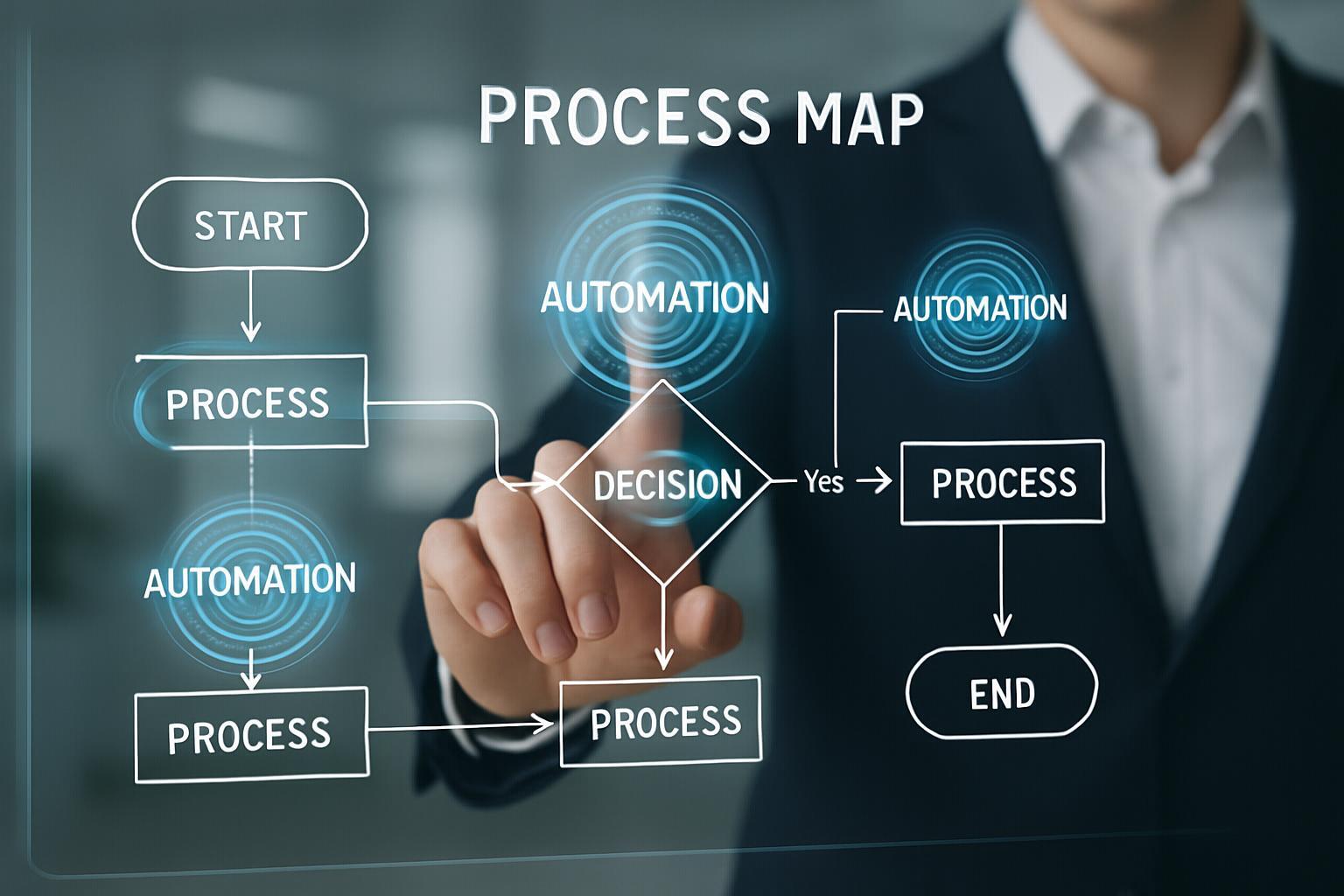By 2025, enterprise artificial intelligence has ceased to be an emerging technology and become a fundamental pillar of organizational competitiveness and efficiency. Companies that have integrated AI solutions into their daily operations are experiencing productivity gains up to five times higher than the global average, completely redefining the modern business landscape.
The AI-driven digital transformation is revolutionizing all economic sectors, from manufacturing to financial services, creating new opportunities and challenging traditional business models. This article explores how companies are implementing artificial intelligence to optimize operations, improve customer experience, and gain significant competitive advantages.
Current Overview of AI Adoption in Businesses
The pace of AI application adoption in businesses has accelerated dramatically in recent years. According to recent data, 75% of business leaders are actively using generative AI technologies in 2025, compared to 55% in 2024. This exponential growth reflects how enterprise artificial intelligence has gone from being an experimental innovation to an operational necessity.
Organizations are increasing their investments in intelligent technologies at an annual rate of 14%, prioritizing AI projects that can be scaled quickly. However, there is a clear implementation gap: while 30% of technologically advanced companies have managed to scale their AI solutions across the entire organization, the remaining 70% are still struggling to move beyond the experimental phase.
By sector, the penetration of AI in businesses shows differentiated patterns:
- Technology and finance lead adoption with 30% of companies implementing AI on a large scale
- The manufacturing sector has integrated AI-based autonomous systems in 40% of its industrial plants
- Retail and services are experiencing accelerated growth, with 38% of customer interactions managed by autonomous agents
Practical Applications of AI Transforming Business Operations
Enterprise AI applications are generating quantifiable impacts in multiple operational areas. These practical implementations demonstrate how technology is transforming daily workflows.
Intelligent Process Automation
AI-powered automation has evolved far beyond simple repetitive tasks. In 2025, AI-based business systems are managing complex operations that previously required constant human intervention:
- Intelligent document management: Natural language processing algorithms analyze, categorize, and extract relevant information from corporate documents, reducing processing time by 85%.
- Invoicing and finance: AI automates tasks such as account reconciliation, invoice processing, and anomaly detection, freeing up financial personnel for strategic analysis.
- Predictive maintenance: IoT sensors combined with AI monitor industrial equipment in real time, reducing downtime by 40% and repair costs by 35%.
Companies like Amazon have automated 90% of their inventory management using AI, minimizing errors by 45% and optimizing their entire logistics chain.
Personalized Customer Experience
AI applied to business is redefining how companies interact with their customers, offering hyper-personalized experiences at scale:
- Advanced virtual assistants: AI-integrated chatbots, such as those offered by Trengo, act as true assistants capable of updating customer information, processing refunds, and resolving complex queries.
- Predictive recommendations: Spotify uses AI algorithms to analyze 500 million daily variables, achieving 80% of its reproductions from personalized recommendations.
- Proactive attention: AI systems anticipate customer needs before they manifest, generating a 40% increase in satisfaction according to experience metrics.
In the retail sector, personalization tools like Dynamic Yield have increased conversion rates by 25% through real-time interface adaptation based on user behavior.
Supply Chain Optimization

Artificial intelligence for businesses is radically transforming supply chains, making them more agile, efficient, and resilient to disruptions:
- Ultra-precise demand prediction: Machine learning models analyze variables such as seasonality, trends, external events, and historical patterns to predict demand with unprecedented accuracy.
- Logistics route optimization: AI analyzes real-time data such as traffic, weather conditions, and delivery restrictions to determine the most efficient routes.
- Warehouse automation: Robots equipped with artificial vision and AI capabilities manage storage, sorting, and order preparation operations, significantly improving labor productivity.
Walmart has implemented AI systems to manage its supply chain, reducing inventory waste by 30% through highly accurate demand predictions.
Sectoral Impact: How AI Transforms Specific Industries
AI in business is transforming entire sectors with specific applications for each industry, generating use cases with high return on investment.
Intelligent Manufacturing
The manufacturing sector is experiencing a revolution thanks to enterprise artificial intelligence, accelerating the path towards Industry 5.0:
- Generative design: Generative AI (GenDAI) reduces product development time by 30% and material use by 20%, optimizing components for maximum performance.
- Collaborative robots (cobots): The market for cobots with adaptive AI is growing by 14% annually, allowing safe human-machine collaboration in 65% of advanced factories.
- Automated quality control: Artificial vision systems inspect products with greater accuracy than humans, identifying microscopic defects that would otherwise go unnoticed.
Tesla has incorporated reinforcement learning to optimize its production lines, achieving 94% energy efficiency and significantly reducing material waste.
Financial Services
Financial institutions are leveraging AI applied to business to improve security, personalize services, and optimize operations:
- Fraud detection: Banco Ciudad managed to decrease fraud by 70% using AI models that process 10,000 transactions per second, identifying suspicious patterns in real time.
- Automated financial advice: Platforms like Betterment use AI to manage 15% of retail investment portfolios, with returns 12% above the market average.
- Credit risk assessment: AI algorithms analyze thousands of variables to determine creditworthiness, expanding access to financing while reducing default rates.
AI models in banks now predict defaults with 95% accuracy, reducing credit losses by $120 billion annually globally.
Health and Life Sciences
The healthcare sector is leveraging artificial intelligence for businesses to improve diagnoses, treatments, and patient management:
- Assisted diagnosis: Algorithms like IBM Watson Health analyze medical images with 98% accuracy, surpassing human radiologists in early cancer detection.
- Remote monitoring: Wearable devices connected to AI identify cardiac anomalies with 92% accuracy, reducing hospitalizations by 25%.
- Accelerated drug development: AI is reducing the time to discover new drugs from years to months, analyzing millions of chemical compounds and their interactions.
Johns Hopkins Hospital has implemented AI systems that reduce medication errors by 55% through real-time verification, significantly improving patient safety.
AI and Strategic Business Decision-Making

One of the most significant impacts of enterprise AI is its ability to transform corporate decision-making, providing data-driven insights that were previously unattainable:
- Advanced predictive analysis: 79% of corporate strategists consider AI essential to anticipating market changes and making proactive decisions.
- Scenario simulation: AI models allow the creation of complex simulations to assess the potential impact of different strategies before their implementation.
- Resource optimization: Dynamic allocation algorithms improve asset utilization by 35% in logistics companies, maximizing return on investment.
AI is reducing data analysis time by 90%, allowing organizations to respond strategically to market changes in hours instead of weeks, a crucial competitive advantage in volatile environments.
The Future of Work in the Age of Enterprise AI
Contrary to initial fears about massive job displacement, AI in business is transforming work in more nuanced ways:
- Role evolution: 77% of companies invest in upskilling programs to adapt employees to hybrid human-AI roles, where the capabilities of both complement each other.
- New professional profiles: 43% of organizations plan to hire machine learning engineers, AI ethics specialists, and implementation experts during 2025.
- Increased productivity: In manufacturing, operators equipped with AI systems increase their productivity by 50% without increasing working hours, focusing on higher-value tasks.
Organizations are redesigning workflows to maximize the complementary strengths of humans and AI: human creativity, ethical judgment, and strategic thinking combined with the speed, precision, and scalability of AI.
Ethical and Operational Challenges in AI Implementation
Despite its benefits, the adoption of enterprise artificial intelligence presents significant challenges that organizations must address:
- Algorithmic biases: 68% of AI-based recruitment models show unintentional gender discrimination, requiring continuous audits and diversity in training data.
- Privacy and compliance: 60% of companies violate regulations such as GDPR when implementing AI, exposing themselves to significant fines and reputational risks.
- Regulatory gap: Only 22% of countries have updated legal frameworks to govern the business use of AI, creating regulatory uncertainty.
Leading companies are adopting responsible AI frameworks, establishing ethics committees, implementing algorithmic auditing systems, and developing transparent policies on data use and automated decision-making.
Investment in Enterprise AI: Costs and Return on Investment
Implementing AI applications in business requires significant investment, but with the potential for substantial returns:
- Implementation budgets: 70% of medium and large companies will allocate between $50 and $250 million to AI projects in 2025, prioritizing initiatives with a direct impact on revenue or efficiency.
- ROI measurement approaches: 62% of executives are changing their valuation metrics, prioritizing productivity indicators over immediate financial gains.
- Long-term impact: Leading organizations attribute 53% of their projected profits for 2025 to strategic investments in AI and automation.
The most successful companies are adopting a portfolio approach to AI investment, combining low-risk/quick-return projects with long-term transformative initiatives that can generate sustainable competitive advantages.
The 2026-2030 Horizon: Emerging Trends in Enterprise AI
Looking beyond 2025, several emerging trends will shape the future of artificial intelligence for businesses:
- Specific-purpose AI: Compact models optimized for specific tasks (medical diagnosis, financial prediction) will dominate 60% of the market by 2027, offering greater efficiency and lower computational cost.
- Technological convergence: The integration of AI with blockchain and IoT will generate $3.1 trillion in value in smart cities and industrial ecosystems by 2030.
- Quantum AI: Algorithms run on quantum computers will solve complex logistical problems 100 times faster than current systems, revolutionizing sectors such as pharmaceuticals and finance.
The democratization of enterprise AI will be another key trend, with no-code platforms and accessible APIs allowing companies of all sizes to implement intelligent solutions without needing specialized data science teams.
Conclusion: Preparing Your Company for the Age of AI
Artificial intelligence for businesses has gone from being a disruptive technology to becoming a structural component of competitive advantage. Organizations that manage to balance technological innovation with ethical governance are leading their sectors and setting new standards of efficiency and personalization.
For companies that are still starting their AI-driven digital transformation journey, the time to act is now. Developing a clear strategy, building internal capabilities, selecting high-impact use cases, and collaborating with specialized technology partners are fundamental steps to harnessing the potential of AI in business.
Ultimately, success in implementing enterprise artificial intelligence lies not only in technology, but in the organization's ability to reimagine processes, develop new business models, and cultivate a culture of continuous innovation driven by data.


